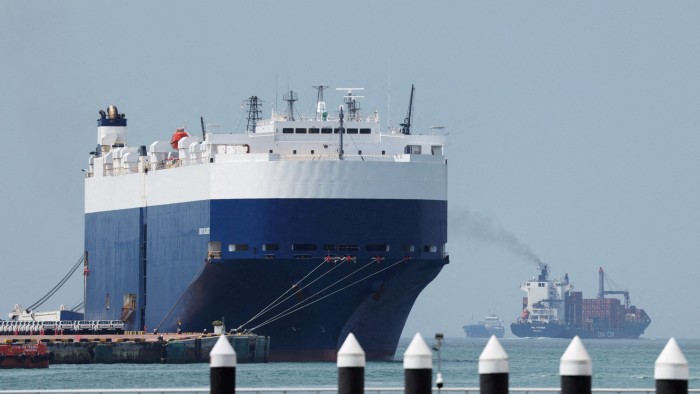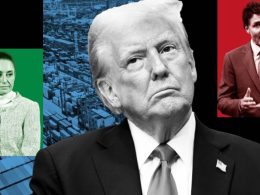Unlock the White House Watch newsletter for free
Your guide to what Trump’s second term means for Washington, business and the world
Donald Trump’s campaign to block a climate agreement for the world’s shipping industry appeared to be heading for the rocks as nearly 100 nations gather in London to approve a UN-backed plan to decarbonise the sector.
The Trump administration has threatened to impose sanctions against countries that vote to approve the International Maritime Organization’s Net Zero Framework to tackle greenhouse gas emissions, but there was increasing support for the scheme when it was debated at the IMO’s headquarters ahead of a final agreement in coming days.
After nearly two years of fraught negotiations, there was a breakthrough when 63 members passed the framework in April, including China, Brazil, the EU, the UK and India, while 16 countries opposed it, led by fossil fuel producers, including Saudi Arabia and the United Arab Emirates.
A vote to make the plan legally binding is due at the IMO’s Marine Environment Protection Committee by Friday but there was growing confidence on the sidelines of the four-day meeting this week that the US’s attempt to block the deal would now fail.
Several smaller Pacific Island nations, including Vanuatu and Kiribati, who had initially abstained from voting in April because they argued the framework was not ambitious enough, said they would now back the agreement, bolstering expectations it would be adopted.
If agreed, the legally binding regulation would be a rare victory for climate diplomacy since the start of the second Trump presidency, coming just weeks after he described climate change as “the greatest con job ever perpetrated on the world” and ahead of the UN COP30 climate summit in Belém, Brazil next month.
“It is telling the world that climate diplomacy is still relevant, it’s still ambitious, and climate multilateralism is still alive and well in spite of the open hostility,” said Emma Fenton, senior director for climate diplomacy at Opportunity Green, a climate-focused non-profit organisation.
The Trump administration’s fierce opposition to the agreement, which it described as a “European-led neocolonial export of global climate regulations”, puts it squarely at odds with China whose President Xi Jinping last month called the green transition “the trend of our time”.
The shipping industry delivers about 80 per cent of international trade and contributes an estimated 3 per cent to the emissions behind climate change. Traditionally, it burns fuel made of heavy oils, or bunker fuel, which causes a high levels of pollutants, including sulphur dioxide, estimated at 2,000 times as much as the diesel used in cars.
The International Chamber of Shipping, whose members represent more than 80 per cent of the world’s merchant fleet, said ahead of the vote that it was confident the measure would now be adopted.
To incentivise shipowners to clean up the industry, the scheme will impose a carbon price on emissions for ships bigger than 5,000 tons, which is expected to generate revenues of up to $15bn per year from 2030. Negotiations are due to start next week on how to spend the revenues.
As the IMO meeting got under way, the US delegate warned that the Net Zero Framework was of concern “at the highest levels” of the Trump administration, promising the US would “not hesitate to protect the American people and their economic interests” if the deal was passed.
In a statement, the administration listed retaliatory measures against supporters of the deal, including sanctioning officials, blocking ships from entering US ports and visa restrictions on cruise ship crews transiting through the US.
However, the IMO secretary-general Arsenio Dominguez urged nations to back the pact or risk a proliferation of competing schemes that would ultimately increase costs for the industry.
“Prolonged uncertainty will put off investments and diminish confidence in the IMO, your organisation,” he said.
Ali Mohamed, climate envoy for Kenya, said the emissions from shipping were similar to those of all African countries combined. The global framework was a “necessary mechanism to avoid a patchwork of national or regional measures being unilaterally imposed”, he told the Financial Times.
Climate Capital

Where climate change meets business, markets and politics. Explore the FT’s coverage here.
Are you curious about the FT’s environmental sustainability commitments? Find out more about our science-based targets here
Source link









